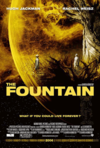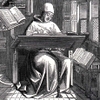 Last month, when I was reading a lot of science fiction writer Greg Egan (in between visits to V. in the hospital), I was getting caught up in his characters – and not always agreeably: as Egan has a lot of interest in 'hard' science, his people tend to disdain the humanities, religion, emotion, and idealize science as All. I kept trying to parse this in a way that would either make Egan foolish or wise, but his writings remain in-between – he knows how confused his scientists get when they try to impose their scientific training on the more difficult aspects of the universe around them, but he also seems to think that any 'cultural' response to the world is simply outdated. Or almost, anyway; it's ambiguous territory in his work, and I suspect he is still (after five or six novels and a lot of stories) working out his position on all this.
Last month, when I was reading a lot of science fiction writer Greg Egan (in between visits to V. in the hospital), I was getting caught up in his characters – and not always agreeably: as Egan has a lot of interest in 'hard' science, his people tend to disdain the humanities, religion, emotion, and idealize science as All. I kept trying to parse this in a way that would either make Egan foolish or wise, but his writings remain in-between – he knows how confused his scientists get when they try to impose their scientific training on the more difficult aspects of the universe around them, but he also seems to think that any 'cultural' response to the world is simply outdated. Or almost, anyway; it's ambiguous territory in his work, and I suspect he is still (after five or six novels and a lot of stories) working out his position on all this.
It's related to that silly Dawkins book on atheism – which was so sharply parodied in episodes of South Park last fall – the absurd pretension that, not only does a modern scientist know better than anyone the depths of the universe; but also that, even within the limitations of modern scientific training, one can somehow pretend to know the 'real' truth behind all sorts of absolutes. It's the true absurdity of atheism – although I do tend to be uncomfortable with institutional religion, as well as with people who are certain enough of their beliefs that they need for me to agree with them, the certainty that there is 'nothing out there' is of course the most ridiculous belief of all.
I know all of this is fairly obvious, but – I'm always particularly amazed by the part of scientific reasoning where one goes through the process of saying: we can only know what we perceive under modern, accepted conditions; and we can only accept what we can extrapolate, both forwards and backwards, inwards and outwards, from those conditions; and therefore everything not extrapolated from those (obviously culturally limited) conditions is not merely unknown, but by definition nonexistent – which always seemed like the most ridiculous myopia, the most incompetent kind of thinking, especially indulged in by people who pride themselves on their ability to think. It divides the world into Mulders and Scullys – either we are so desperate to believe something that we distort everything we see to support that belief, or we are so skeptical that we distort our perceptions just as much to exclude any discourse that doesn't fit the basic tenets of our undergraduate textbooks in chemistry, cosmology... and, of course, medicine.
Seeing The Fountain, a movie from 2006 where Hugh Jackman and Rachel Weisz are tracked through three story lines in different centuries, brings all of this up again. The movie is a lovely poem of pictures; it's also unfortunately a rather silly tangle of ideas – the future images are interesting, but the story set in 1500 where Isabella is besieged by the Inquisition, and sends an unknown conquistador to find a tree/fountain of life, gets exasperating in its counter-historic clumsiness. Oh well, too bad, another oversimplified fantasy.
But the part of the story that occurs in the present, where a scientist is trying to find an instant cure for brain tumors to save his dying wife (yes, okay, quite nonsensical on its own – he's going to find just the right drug for this kind of tumor in the few days that are left before she dies? – the stuff of oversimplified daytime television movies) keeps Jackman stuck in a predictable but rather two-dimensional position – he is so frantic to get back to the lab to operate on monkeys, so that he can discover his miracle cure, that he doesn't actually spend much time with his wife, nor is he willing to listen to her when she talks about dying.
Okay, sure: obsessed with a cure, he's also really really bad at facing reality, and almost petulant in the face of the obvious need to simply spend time with her. It makes sense to some extent, but is so utterly childish – and quite stupid, really: it's not only his insistence on being the Enlightenment-style master of reality (mankind as in charge, surgeon as savior) but much more the fact that he doesn't even seem to realize how much of reality, of time, of love, he's missing out on: because he doesn't want her to die he doesn't want to face her dying, which means of course he misses out on all that there is left of her life.
Aargh. Stupid scientists.
When I turned from working on the sciences to go to the arts – around when I was sixteen – I did it for different reasons: actually, I did it because I wanted to work in an area where things seemed more mysterious, where I didn't feel I could find answers easily. I've always dug into places where I wasn't already able to intuit the final outcome (avant-garde, graphic scores, maps of time and perception); had I stayed in the sciences I might have had a better financial time of it, because frankly I would probably have been more skilled at my job; but I think I might have been a bit bored, especially with a daily world that had a visible 'end' to it.
But worse, far worse, if I had ended up being one of those guys who simply Didn't Get It – who simply couldn't accept that the universe is big and complicated and impossible to quantify, who thought that death and people and feelings could somehow be reduced to something manageable....
I'm so glad I spent that time with V. in the hospital. I'm so glad I don't think I know for certain where she is now, or if she is anywhere at all – and so glad I don't know where Reid is, and Jay, and Bill, and all the others. And so glad I don't think I know where I'm going, after I die, either.
Such a relief....



